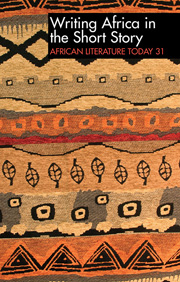Book contents
- Frontmatter
- Dedication: Chinua Achebe Joins the Ancestors
- Stop Press/ Tribute to Kofi Awoonor 1935–2013
- Contents
- Notes on Contributors
- Editorial Article
- Articles
- “Real Africa”/“Which Africa?”: The Critique of Mimetic Realism in Chimamanda Ngozi Adichie's Short Fiction
- Writing Apartheid: Miriam Tlali's Soweto Stories
- Articulations of Home & Muslim Indentity in the Short Stories of Leila Aboulela
- Ugandan Women in Contest with Reality: Mary K. Okurutu's A Women's Voice & the Women's Future
- Snapshots of the Botswana Nation: Bessie Head's The Collector of Treasures & Other Botswana Village Tales as a National Project
- Widowhood – Institutionalized Dead Weight to Personal Identity & Dignity: A Reading of Ifeoma Okoye's The Trial & Other Stories
- Feminist Censure of Marriage in Islamic Societies: A Thematic Analysis of Alifa Rifaat's Short Stories
- Diaspora Identities in Short Fiction by Chimamanda Ngozi Adichie & Sefi Atta
- Exposition of Apartheid South African Violence & Injustice in Alex la Guma's Short Stories
- Locating a Genre: Is Zimbabwe a Short Story Country?
- Mohammed Dib's Short Stories on the Memory of Algeria
- Ama Ata Aidoo's Short Stories: Empowering the African Girl-Child
- Ama Ata Aidoo: an Interview for ALT
- Reviews
Feminist Censure of Marriage in Islamic Societies: A Thematic Analysis of Alifa Rifaat's Short Stories
from Articles
Published online by Cambridge University Press: 05 December 2013
- Frontmatter
- Dedication: Chinua Achebe Joins the Ancestors
- Stop Press/ Tribute to Kofi Awoonor 1935–2013
- Contents
- Notes on Contributors
- Editorial Article
- Articles
- “Real Africa”/“Which Africa?”: The Critique of Mimetic Realism in Chimamanda Ngozi Adichie's Short Fiction
- Writing Apartheid: Miriam Tlali's Soweto Stories
- Articulations of Home & Muslim Indentity in the Short Stories of Leila Aboulela
- Ugandan Women in Contest with Reality: Mary K. Okurutu's A Women's Voice & the Women's Future
- Snapshots of the Botswana Nation: Bessie Head's The Collector of Treasures & Other Botswana Village Tales as a National Project
- Widowhood – Institutionalized Dead Weight to Personal Identity & Dignity: A Reading of Ifeoma Okoye's The Trial & Other Stories
- Feminist Censure of Marriage in Islamic Societies: A Thematic Analysis of Alifa Rifaat's Short Stories
- Diaspora Identities in Short Fiction by Chimamanda Ngozi Adichie & Sefi Atta
- Exposition of Apartheid South African Violence & Injustice in Alex la Guma's Short Stories
- Locating a Genre: Is Zimbabwe a Short Story Country?
- Mohammed Dib's Short Stories on the Memory of Algeria
- Ama Ata Aidoo's Short Stories: Empowering the African Girl-Child
- Ama Ata Aidoo: an Interview for ALT
- Reviews
Summary
Freedom
My freedom
I shall carve the words in the earth
chisel their sounds
over every door in the Levant…
below the slope at every street
corner inside the prison
within the torture chamber
(Fadwa Touqan cited in Mikhai 2013)Formal literary writing began far later for women than men. In England for instance, Fitzmaurice et al. (1997) assert that it is virtually impossible to name a woman writer prior to Jane Austen even though women were writing as early as the time of Chaucer (1). They argue that until the seventeenth century, women writers were viewed as ‘odd’ adding that ‘the enormous commercial and artistic success of Aphra Behn's plays on the London stage of the 1670s and 1680s marked the end of the time where only men were literary luminaries’ (1).
The suppression of female expression has been a global phenomenon. In Africa, the formal education of women and their ability to express themselves in writing began even later. Many female writers on the continent in the 1980s and 1990s had very little or no education. Writing on the continent was the preserve of the masculine gender at the time for the simple reason that females were then deterred from attaining a formal education (Bertons 2001: 94). Hence though they told stories under the moonlight and by the kitchen fire; that was as far as it went.
- Type
- Chapter
- Information
- Writing Africa in the Short Story , pp. 89 - 101Publisher: Boydell & BrewerPrint publication year: 2013



